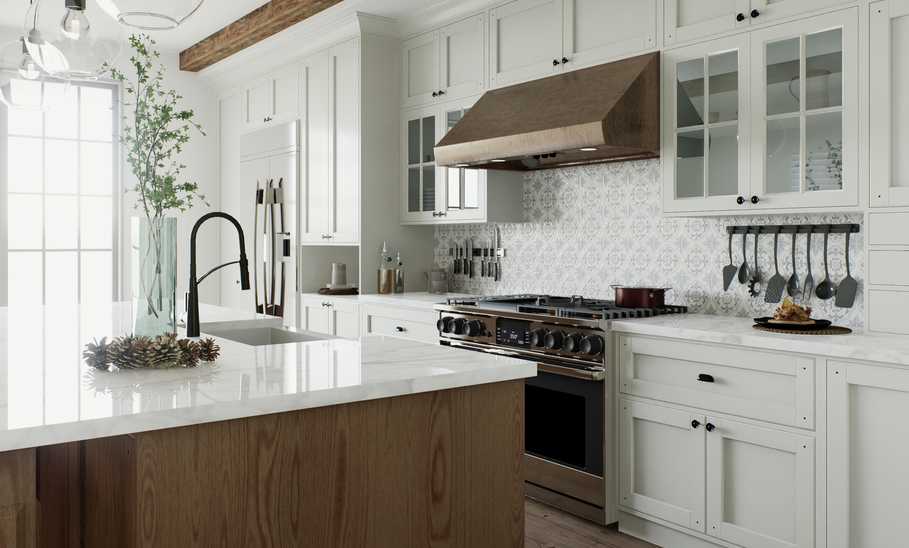How Much Does It Cost to Remodel a Kitchen? Always More Than You Expect

Our evaluations and opinions are not influenced by our advertising relationships, but we may earn a commission from our partners’ links. This content is created by TIME Stamped, under TIME’s direction and produced in accordance with TIME’s editorial guidelines and overseen by TIME’s editorial staff. Learn more about it.
Growing up, my family performed most of our home repairs and renovations—meaning my father rarely hired anyone to do any of them. When I bought my first home in the late 1990s, he came and stayed with me for a couple weeks to help with my kitchen renovation, including installing ceramic tile on the floor and counter, a new sink, cupboard doors, and appliances. While that kitchen remodel turned out okay and there are certainly many renovation tasks that a large number of people can complete on their own, hiring a professional ideally makes the process easier and more efficient, albeit much more expensive. Today, I live (and own) an apartment in a New York City co-op where remodeling a kitchen is a pricey prospect.
A variety of things can affect the cost of a kitchen remodel. The first is the project scope.
In general, contractors categorize remodels as minor, moderate, or major. According to Dan Strauss, sales director at AAA Distributor, a minor remodel typically focuses on cosmetic updates like new countertops, cabinet refacing, and possibly paint. For reference, when I initially bought my apartment (and had very little disposable cash left over), I hired Home Depot for a cabinet reface including new cabinet hardware, new marble countertops, and a new sink. This cost me around $10,000 about 11 years ago and took two days to complete.
A moderate remodel, says Strauss, which “incorporates new appliances, custom cabinets, and perhaps a reconfigured layout ranges from $20,000 to $50,000. Major remodels, where walls are moved and high-end finishes are selected, can easily exceed $50,000.”
As someone who always seems to pick out the most expensive thing in a store, I can confirm that your choice of materials makes a significant difference in your remodel’s overall cost. Real wood cabinets cost more than those made with manufactured lumber. Marble, granite, and quartz countertops are more expensive than, say, those made from laminates. If you want a refrigerator with all kinds of bells and whistles, you could spend up to $3,000 on it alone. Custom features like high-end finishes, islands, or built-ins will add to your overall price as well.
Every quote you receive from a contractor should include a breakdown that shows their labor estimate for your project, as well as any fees they may charge. The cost of labor varies by location, anywhere from $50 to $200 an hour. Speaking of location…
“Research the typical costs for different levels of remodels in your area,” says Diana George, founder and principal of California-based DG Design Group Builders. For example, George explains that, in the San Francisco Bay Area where her company is based, minor remodels involving painting, hardware replacement, and lighting updates usually cost between $15,000 to $25,000. Moderate remodels, which might include replacing cabinets, countertops, and appliances, range from $50,000 to $75,000, and major remodels, featuring structural changes, luxury finishes, and high-end appliances, can exceed $160,000. From my experience, these costs are comparable to what you’d expect to pay in the New York City area. If you live somewhere outside of a major metropolitan area, your overall price could be much lower.
George also advises including a contingency of 10 to 20% of your budget to cover unexpected expenses.
“Gather multiple quotes from contractors and designers,” she says. You can also elect to speak with a design firm such as the one she runs to compare prices and services. Block Renovations is another company that allows you to collect multiple contractor quotes to compare. These can help you make an informed decision and avoid overpaying.
Remodeling a bigger kitchen will usually cost more than a smaller one in part due to the materials requirement. More floor space equals more of whatever flooring material you choose, and more cabinets mean the overall cost to replace and install will be higher.
“There’s a variation in the overall cost of a kitchen remodel depending on the scope of the project,” says Jay Sanders, a licensed contractor and owner of Baltimore-based Maryland Contractors.
Minor changes include painting and replacing fixtures while new appliances and semi-custom cabinets are considered moderate changes. A major kitchen remodel normally encompasses some structural changes and/or high-end materials.
Be aware—he says any hidden issues like outdated wiring or plumbing can increase the budget 10 to 20%. That’s why that contingency fund is important. Consider getting an early inspection to identify potential issues which may arise later on.
“It’s important to get the estimation through proper communication with contractors in order to set a realistic budget,” Sanders continues, “You can control the cost by selecting standard materials over luxury options.”
In general, average costs will fall under the following parameters:
Having been through a moderate to approaching-major bathroom remodel recently, I can say that most of the time, it feels as if it’s going everywhere: the contractor, the city (permits), the super or building manager, the delivery company, the inspector, the tile guy, the electrician, the plumber, and on and on.
One of the biggest annoyances about hiring any contractor is once you’ve paid your customary 50% up front and they’ve demoed your space, you’re kind of stuck with them. Which is why research, multiple quotes, and reading customer reviews is so important.
Your contractor should be able to give a detailed breakdown of where the money is going if you ask. If they can’t, choose a different contractor. Another thing I noticed during my remodel was that I could often find the fixtures and appliances I wanted for a lower price than what my contractor quoted. This is because some contractors have arrangements with certain suppliers they always use. You should be given the option though, to do your own leg work and purchase materials on your own if you wish. Even the fancy, high-end, remodeling company I used in the city allowed me to do that. They also had a predetermined price list that detailed almost every scenario that might arise, stating how much the additional cost would be if it did; things like adding insulation, relocating an electrical or gas line, repairing unexpected drywall, etc.
From my extensive reading on various home remodeling sites such as Angi.com and Home Depot, as well as personal experience, these are some general guidelines for exactly where your money may go.
“You never know what's behind the walls of your home,” says Terverius Black, founder of Maverick Builders. The home’s age is also a factor in what the ultimate cost of the remodel will be. The older a house, says Black, the more you can expect to pay for the "unforeseen" issues.
“Even with careful planning, there are often surprises that can increase your kitchen remodel budget,” says George. There may be hidden structural issues such as water damage, mold, or outdated building codes you’ll have to deal with. During the project, you might decide on upgrades or additional changes, such as moving or adding a window, removing a wall, adding a new backsplash or upgraded appliances, all of which can add to the overall cost, she explains.
Permits and regulations also play a role. Depending on your contractor and where you live, you may need permits for certain aspects of the remodel. These fees vary and are often overlooked during the initial budgeting phase. For my bathroom remodel, I paid something like $600 for the electrical permit because it was the bathroom. All the electrician did was replace one outlet, one switch, and one light fixture. Updating plumbing or electrical systems to meet current codes can further add to your budget.
“Supply chain issues can also delay the project, leading to increased costs for labor and materials,” says George. My tub faucet took over five months to arrive and one of my neighbors waited nine months for their bathtub to come in.
For financing options, Black suggests looking at the equity already in your home. “Home equity loans or lines of credit are popular choices because they use your home as collateral, often resulting in lower interest rates compared to personal loans,” explains George.
If you have a good credit score, personal loans provide a quick and easy financing solution, although the interest rates can be higher than home equity loans. Some government programs offer loans or grants for home improvements, such as the FHA 203(k) loan which is a government-backed mortgage that enables homebuyers and homeowners to finance both the purchase or refinancing of a property and the cost of its renovation through a single loan.
“This makes it easier for buyers to invest in homes that need repairs without having to obtain separate financing for the improvements,” says George. She adds that the majority of her clients use a Home Equity Line of Credit (HELOC), stocks, or savings to pay for their home remodel.
Black points out that some contractors offer financing options. “Choose one that works with your budget overall and your budget structure,” he says. My bathroom remodel required a 50% deposit up front. The remainder was split between multiple payments when key milestones were achieved, such as new plumbing completed, fixture installation, flooring, etc.
Check with your local bank as well, especially if you already have a relationship with one. Often, explains Black, they’ll be more willing to lend to someone with ties to the communities they serve locally.
Again, it's super important to obtain multiple estimates. Black recommends three quotes at minimum, and having 20% to 30% of your budget set aside in available funds to cover the unforeseen items.
My tactic when comparing quotes is never go with the least expensive or most expensive option. If a quote comes in significantly lower than all the others, my untrusting nature deems it suspicious. For me, the thinking that if something seems too good to be true, it probably is, can be applied to contractor quotes.
“To set a realistic budget, start by determining your priorities," says George. Do you yearn for high-end appliances, custom cabinetry, or specific countertops? If so, allocate your funds appropriately. Research the typical costs for different levels of remodels in your area.
If you’re using a home equity loan or line of credit, determine your spending limit based on your financial situation, says Curtis Howse, EVP and CEO of the Home & Auto platform at consumer financing provider, Synchrony. He says it's important to break down costs into categories like cabinets, labor, appliances, and unforeseen expenses.
“This approach helps ensure the project stays within financial limits and accounts for unexpected costs. Homeowners should also think about how much they can afford to pay per month, if planning to finance, and look into equal monthly payment financing options,” he says.
No matter how much planning, organizing, and budgeting you do, in my experience, there will always be unexpected costs. Remodels can also be very stressful and emotional, because well, you’re spending a very large sum of money, so remember to take care of yourself. I think most contractors are used to a homeowner having at least one melt down (warranted or not) during the process—or maybe that’s just something I believe to make myself feel better.
I also think it’s important to remember that, in most cases, you’re only going to do this remodel once. And, as my late, very practical and handy father always advised, “It’s better to just do it right the first time.” This could mean splurging on the type of flooring you’ve always dreamed of or matte black faucets (if you’re lucky enough to have that option) or spending a ridiculous amount of time in antique and vintage marketplace searching for just the right light fixture or farmhouse sink.
The information presented here is created by TIME Stamped and overseen by TIME editorial staff. To learn more, see our About Us page.



